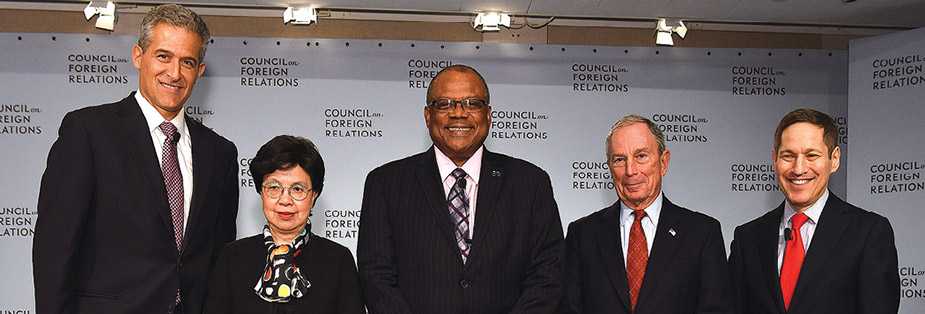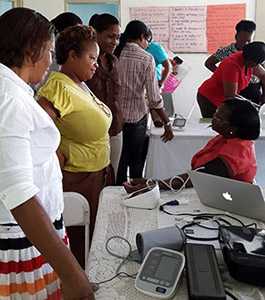CDC and WHO Launch New Global Hearts Initiative

Presenters at the Global Hearts Initiative launch in New York City on September 22, 2016. From left to right: Richard Besser, Margaret Chan, John Boyce (Minister of Health of Barbados), Michael Bloomberg, Tom Frieden.
Worldwide, more people die annually from cardiovascular diseases (CVDs) than any other cause. In 2012, an estimated 17.5 million people died from CVDs. By 2030, CVDs are projected to cause 22 million deaths a year. Thirty-four percent of CVD deaths occur in people under 70 and are largely preventable. About 80 percent of CVD deaths are due to heart attacks and strokes and occur in low-and middle-income countries (LMICs), where barriers to accessible and affordable health care may be more prevalent. High blood pressure, or hypertension, is the leading risk factor for heart disease and stroke, and accounts for over 12 percent of total deaths.
Partnering for Impact: Addressing the global burden of noncommunicable disease—a threat to sustainable development
The Three-pronged Approach
On September 22, 2016 the WHO and CDC launched the Global Hearts Initiative (Global Hearts) to support governments in strengthening CVD prevention and control. DGHP’s Global Noncommunicable Diseases Branch is part of the CDC team engaged with the initiative. Global Hearts takes a three-pronged approach to addressing the CVD crisis by bringing together complementary population-based prevention strategies in tobacco control (through MPOWER), salt reduction (through SHAKE) and primary care (HEARTS) to advance CVD prevention and control.
- MPOWER focuses on tobacco cessation interventions.
- SHAKE supports governments with evidence-based policy options and examples to help lower sodium consumption.
- HEARTS provides primary care health systems with best practices and tools to improve clinical preventive care for cardiovascular disease.
Barriers to CVD Control

Many LMICs face several challenges that contribute to their CVD burden. Rates of CVD risk factors including high blood pressure, high blood cholesterol, and tobacco use, as well as more sedentary lifestyles, are rising in these countries. Additionally, barriers to quality accessible and affordable care also contribute to disparities between LMICs and high-income countries when comparing global incidence, morbidity, and mortality of CVDs. The current economic costs of CVD and hypertension due to premature death, disability, health care costs, and income and productivity losses are enormous. The economic burden associated with CVD in LMICs accounts for US $3.76 trillion.
Accelerating Progress
Global Hearts supports countries with tools and monitoring systems to take immediate action to reduce heart attacks and strokes. Through the use of evidence-based strategies, Global Hearts aims to accelerate progress towards the United Nations Sustainable Development Goal to reduce premature deaths from heart attacks and stroke by one-third by 2030. Combined, these packages provide a set of high-impact, evidence-based interventions that, when used together, will have a major impact on improving global heart health.
The initiative will be piloted in 2017 and global scale-up will follow. So far, 24 countries have expressed interest in participating. Global Hearts provides countries already working on cardiovascular health projects with the opportunity to prioritize, improve, accelerate scale-up and share best practices. For example, Barbados piloted the Standardized Hypertension Treatment Project, and improved blood pressure control rates by 14.5 percent in one year. Using Hearts resources, the Caribbean island will be able to improve all aspects of cardiovascular health nationwide.
- Page last reviewed: March 24, 2017
- Page last updated: March 24, 2017
- Content source:


 ShareCompartir
ShareCompartir